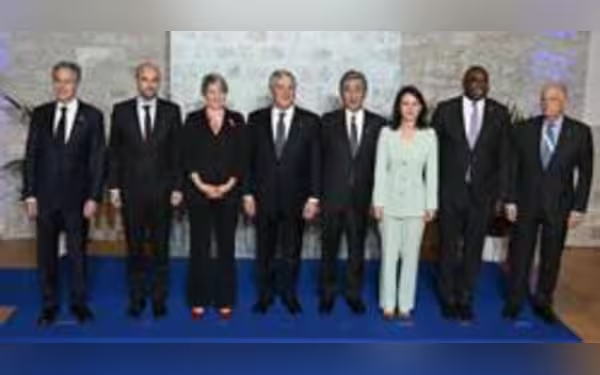Sunday, December 22, 2024 02:33 PM
G7 Foreign Ministers Convene in Italy to Address Middle East Ceasefire
- G7 ministers discuss ceasefire efforts in Gaza and Lebanon.
- Focus on Ukraine support and long-term stability.
- International cooperation emphasized in addressing global crises.
 Image Credits: nation_pk
Image Credits: nation_pkG7 foreign ministers meet in Italy to discuss ceasefire efforts in the Middle East and support for Ukraine amidst ongoing global crises.
The ongoing conflicts in the Middle East and Ukraine have drawn the attention of global leaders, particularly the G7 foreign ministers, who convened near Rome for crucial discussions. This meeting, held in Fiuggi, Italy, is a significant step towards addressing the pressing issues that have been affecting these regions. The G7, which includes Canada, France, Germany, Italy, Japan, the United Kingdom, and the United States, aims to foster international cooperation and find solutions to these complex crises.
During their two-day talks, the G7 ministers focused on various critical topics, including the International Criminal Court’s arrest warrants for Israeli Prime Minister Benjamin Netanyahu and the chief of Hamas. Italy’s foreign ministry highlighted that these discussions would also explore the potential impacts of these warrants on the ongoing crises in Lebanon and Gaza. US Secretary of State Antony Blinken, along with his counterparts from other G7 nations, participated in these discussions, emphasizing the importance of unity in addressing global challenges.
Italian Foreign Minister Antonio Tajani opened the meeting by stating, "Unity is our strength at the moment, I’m referring above all to relations with the Russian Federation." This statement underscores the G7's commitment to a collaborative approach in dealing with international relations, particularly concerning Russia's actions in Ukraine. Tajani also mentioned that strength does not equate to isolation, as he invited foreign ministers from other nations to join the discussions, aiming for a more comprehensive dialogue.
The first session of the meeting was dedicated to the situation in the Middle East, focusing on efforts to achieve a ceasefire in Gaza and Lebanon. The G7 ministers were set to engage with representatives from Saudi Arabia, Egypt, Jordan, the United Arab Emirates, and Qatar, as well as the secretary general of the Arab League. This inclusive approach highlights the G7's recognition of the need for regional cooperation in resolving conflicts.
On the second day of talks, the focus shifted to Ukraine, with the presence of the country’s foreign minister, Andriy Sybiga. The discussions aimed to explore ways to continue supporting Ukraine amidst the ongoing war, as well as prospects for peace and future reconstruction initiatives. This reflects the G7's commitment to not only addressing immediate concerns but also planning for long-term stability in the region.
In parallel, NATO ambassadors and Ukrainian officials were set to discuss Russia’s recent missile tests, further emphasizing the urgency of the situation. Additionally, Britain’s Foreign Secretary David Lammy announced the UK’s largest sanctions package against Russia’s “shadow fleet,” which is reportedly used to bypass export and oil embargoes. This move signifies the G7's determination to hold Russia accountable for its actions.
Moreover, the G7 meeting also addressed tensions in the Asia-Pacific region, with foreign ministers from South Korea, India, Indonesia, and the Philippines invited to participate. The ongoing crises in Haiti and Sudan, along with the political situation in Venezuela, were also on the agenda, showcasing the G7's broad focus on global issues.
The G7 foreign ministers' meeting in Italy represents a vital effort to tackle some of the most pressing challenges facing the world today. By fostering dialogue and cooperation among nations, the G7 aims to pave the way for peace and stability in regions affected by conflict. As global citizens, it is essential to stay informed about these discussions, as the outcomes may significantly impact international relations and the future of global peace efforts.













